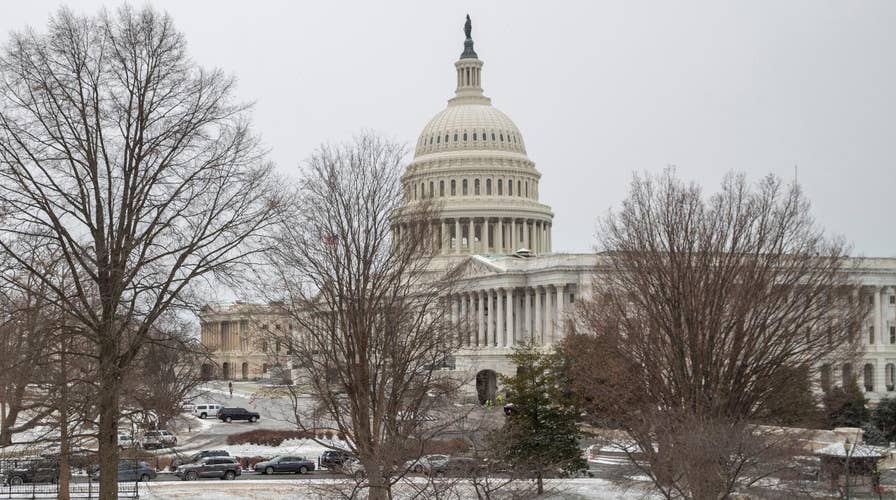Lawmakers return to Capitol Hill to negotiate budget deal
Mike Emanuel reports on where both parties stand on the immigration component.
Proverbs 26:11 admonishes us not to repeat past failures, warning “like a dog that returns to his vomit is a fool who repeats his folly.”
Frustration with Republican Congressional leaders reached a fever pitch in 2017 as little progress was made on longtime promises of repealing ObamaCare and funding the border wall. Thankfully, the party finally came together to pass badly needed tax cuts and repealed ObamaCare’s individual mandate.
But surely, Republicans aren’t foolish enough to quickly squander this positive momentum by repeating past failures? And one year removed from electoral victories based on promises of “Drain the Swamp!” they wouldn’t be so foolish to engage in swamp politics again? Apparently, they are.
A recent Fox News report suggests some Republicans want to return to earmarks, one of the most embarrassing Congressional follies in recent history.
Scratching each other’s backs is how we got $20 trillion in debt. Returning to earmark follies would be a victory for the swamp and a defeat for taxpayers.
Earmarks are simply when members of Congress direct federal spending to local projects in their state. For instance, in a large highway spending bill, the transportation committees would divide a multi-billion dollar bill, and give politicians a few million or billion dollars for their state or district based on seniority or political power. Then these congressmen could choose to spend that money on whichever road or local project they chose.
In theory, no one knows their home state better than the member that represents that area. In practical reality, this led to rampant waste, fraud and corruption. Billions of taxpayer dollars went to frivolous projects with no merit, members built “monuments to me” with roads and libraries named after themselves, and some even went to jail for pocketing money through earmarks.
You might be thinking: “Could earmarks have been that bad?” No, it was worse.
It wasn’t just that individual earmarks wasted billions of dollars, they were the grease used to speed the tracks for runaway spending bills. Leadership and committee chairs used earmarks to buy votes for bad policy and big spending bills.
Some of the most wasteful earmarks included: $320 million for a “Bridge to Nowhere” in a small town in Alaska to connect to an island with 50 residents; $500,000 for a teapot museum in North Carolina; $3.4 million for a turtle tunnel under a highway in Florida; $1 million for a museum commemorating the 1969 Woodstock festival.
“Monuments to me” included: Former Congressman Charlie Rangel, D-NY, earmarked $2 million to the Charles B. Rangel Center for Public Service in New York. It seems half the state of West Virginia has roads and buildings named after the most prolific earmarker of his day, former Democratic Senator Robert Byrd. Also, Senator Mitch McConnell, R-Ky., earmarked $38 million to a Kentucky park that includes a Mitch McConnell Loop Trail and $14 million to a University of Louisville library that now includes the McConnell Center and Elain Chao Auditorium.
And don’t forget the corruption! Former Congressman David Wu, D-Wash., used a $2 million earmark to force the Marine Corps to buy shirts from a company in his district that gave him campaign contributions, but turns out the material could cause severe burns during battle. Former Republican Congressman Duke Cunningham from California was convicted and jailed for taking bribes from lobbyists in return for directing earmarks for them. And former Pennsylvania Democrat Congressman Chaka Fattah got 10 years in prison for using earmarks to enrich himself.
Those who like earmarks claim the White House gets to direct spending through their budget requests, so why can’t Congress do it as well? Because painful experience has proven the failure of Congressional earmarks and appropriation bills can be written to reduce and eliminate bureaucratic earmarks. Congress’ role is supposed to provide oversight of the federal agencies, not join them in adding more wasteful requests.
Earmarks were eliminated in 2010 after a Tea Party wave built on disgust with overspending. The next year, conservatives forced Congressional leaders and President Obama into the first real government cuts in decades through spending caps in the Budget Control Act (BCA) of 2011. And now, Congress is considering ending even these meager spending controls and promising members the ability to start the earmark gravy train all over again.
Congressmen and Senators are in Washington to do what’s best for the country, not get stuff for their states and districts. There is nothing in our oath of office that says we will protect and defend parochial projects.
As Thomas Jefferson wrote to James Madison in 1796 concerning funding for road improvements for mail delivery:
“Have you considered all the consequences of your proposition respecting post roads? I view it as a source of boundless patronage to the executive, jobbing to members of Congress and their friends, and a bottomless abyss of public money… it will be a scene of eternal scramble among the members who can get the most money wasted in their state, and they will always get most who are meanest.”
Scratching each other’s backs is how we got $20 trillion in debt. Returning to earmark follies would be a victory for the swamp and a defeat for taxpayers.

